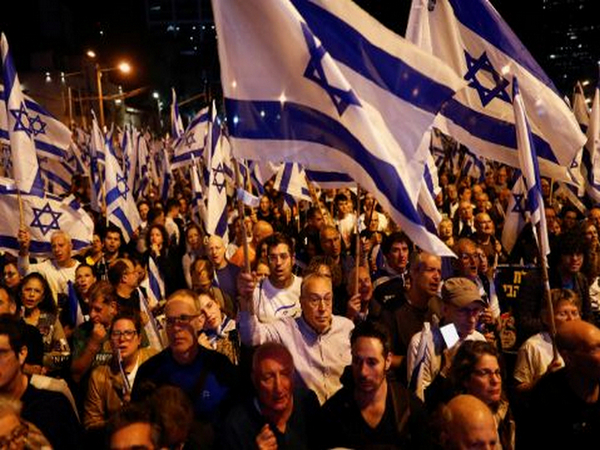
Key bill becomes law amid mass protests
Jul 25, 2023
Tel Aviv [Israel], July 25: Israeli MPs have passed into law a highly controversial bill despite mass protests which aimed to thwart it.
The law removes the power of the Supreme Court to overrule government actions it considers unreasonable.
It is the first to be approved in a series of bitterly contested reforms aimed at curbing the power of courts.
The planned reforms have triggered some of the biggest protests in Israel's history, with opponents warning they imperil Israel as a democracy.
The government argues that the measures are necessary to correct an imbalance in power which has seen the courts increasingly intervene in political decisions in recent decades.
The so-called "reasonableness" bill was approved by 64 votes to 0, after the opposition boycotted the final vote.
In remarks to the Knesset (parliament), opposition leader YairLapid called the step "a takeover by an extreme minority over the Israeli majority".
But Prime Minister Benjamin Netanyahu insisted the court would remain independent. He said the bill was necessary for the government to "carry out policy in line with the decision of the majority of the citizens of the country".
The vote brings to a head months of turmoil, with Israel's president warning political leaders on Monday that the country was "in a state of national emergency".
On Monday morning protesters blocking a boulevard outside the Knesset were sprayed with water cannon and pulled off the road by police amid a cacophony of noise from drums, whistles and air horns.
One protester was hurt, local media say, and six were arrested, police said. Other protesters surrounded a police van shouting "shame" at officers.
A demonstrator lying in the street told the BBC he was defying "dictatorship", adding that his grandfather had been a wartime codebreaker against the Nazis at the UK's famous Bletchley Park.
Asked how long he would stay put he said: "We will never surrender".
Another, ReutYifatUziel, the daughter of a paratrooper pictured in an iconic Israeli photograph of the capture of the Western Wall in the 1967 Middle East war, said she feared for her children's future.
"Netanyahu kidnapped the country and I am worried it will become a theocracy," she said.
The protesters - tens of thousands of whom marched some 45 miles (70km) from Tel Aviv to Jerusalem at the end of last week - set up camp in a park between the Knesset and the Supreme Court, which are located almost next to each other.
Prime Minister Netanyahu was in parliament for the vote hours after being discharged from hospital following unscheduled surgery for a pacemaker on Saturday.
The controversial reforms have polarised Israel, triggering one of the most serious domestic crises in the country's history.
Hundreds of thousands of demonstrators have taken to the streets weekly since the start of the year in protest at what they say is an attack on democracy. The government says the reforms serve to strengthen democracy, arguing the Supreme Court has accrued too much power over politics in recent decades.
Deepening the crisis, thousands of reservists, including pilots in the air force crucial to Israel's offensive and defensive capabilities, have vowed not to volunteer for service. Such unprecedented dissent has caused alarm over the potential impact on Israel's military readiness.
Former heads of Israel's security services, chief justices, and prominent legal and business figures have also been vocal against the government's reforms.
The measures have also been criticised by US President Joe Biden, who in his most explicit comments yet called for the "divisive" reforms to be postponed.
Source: Fijian Broadcasting Corporation









